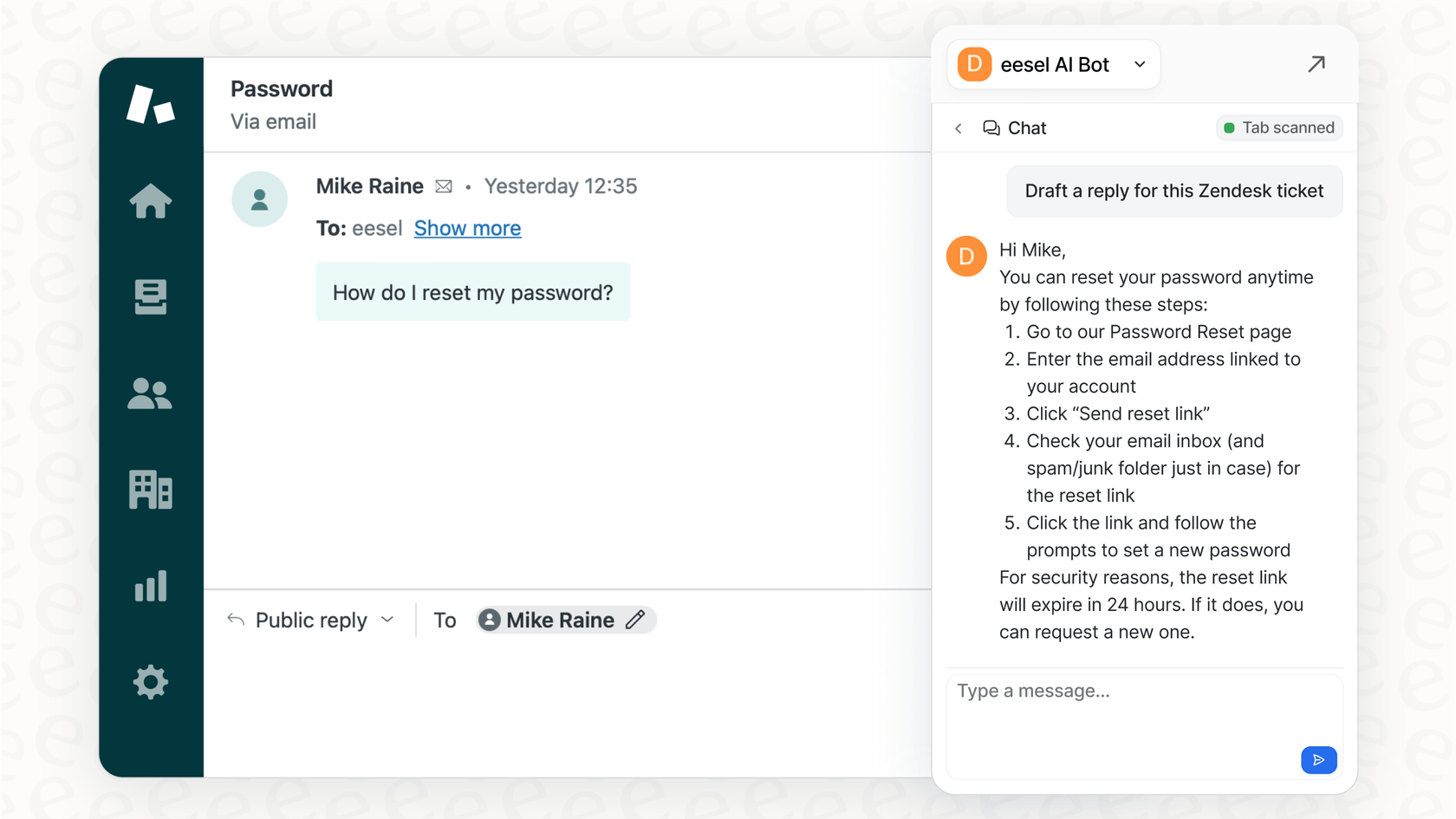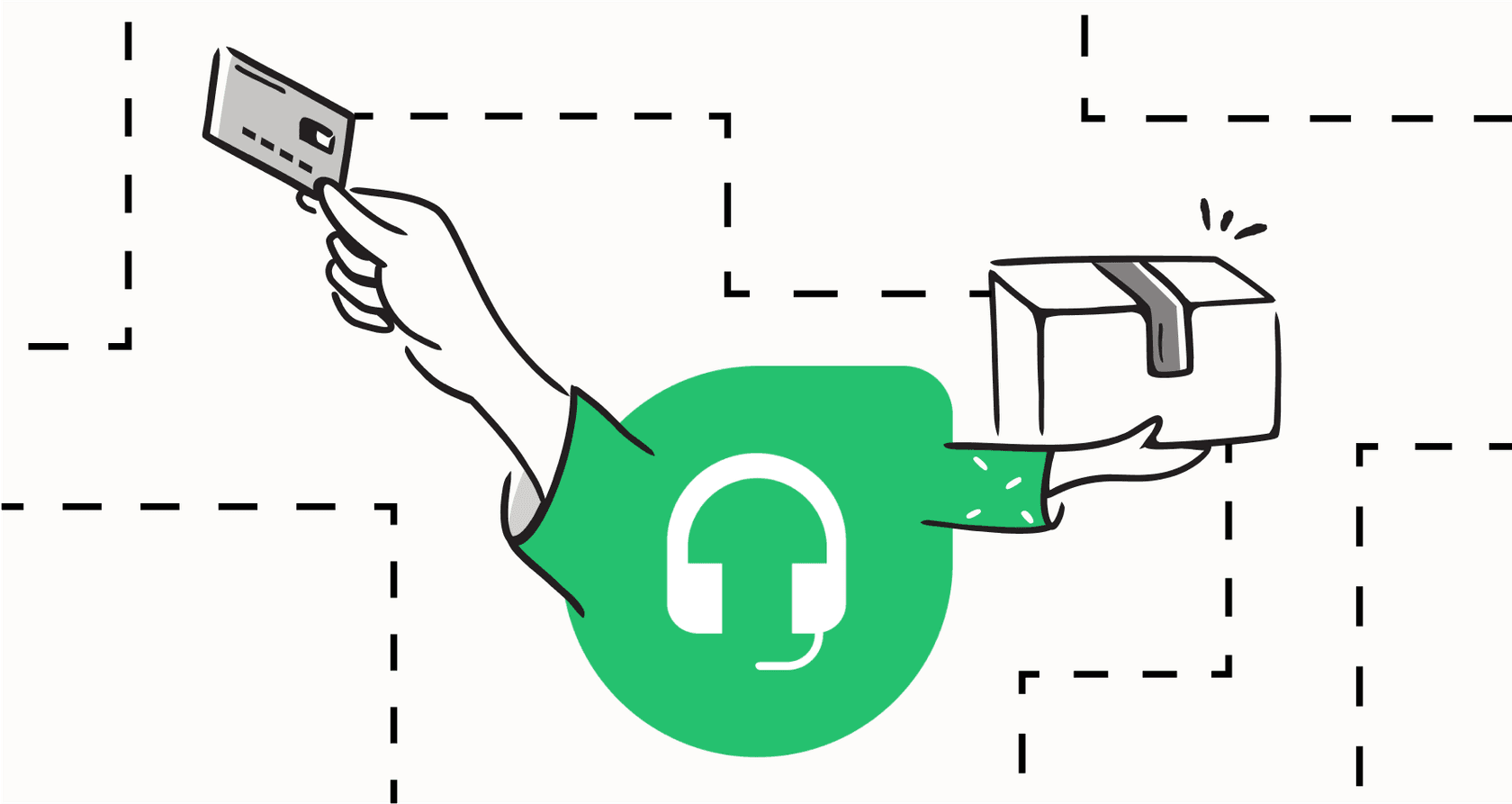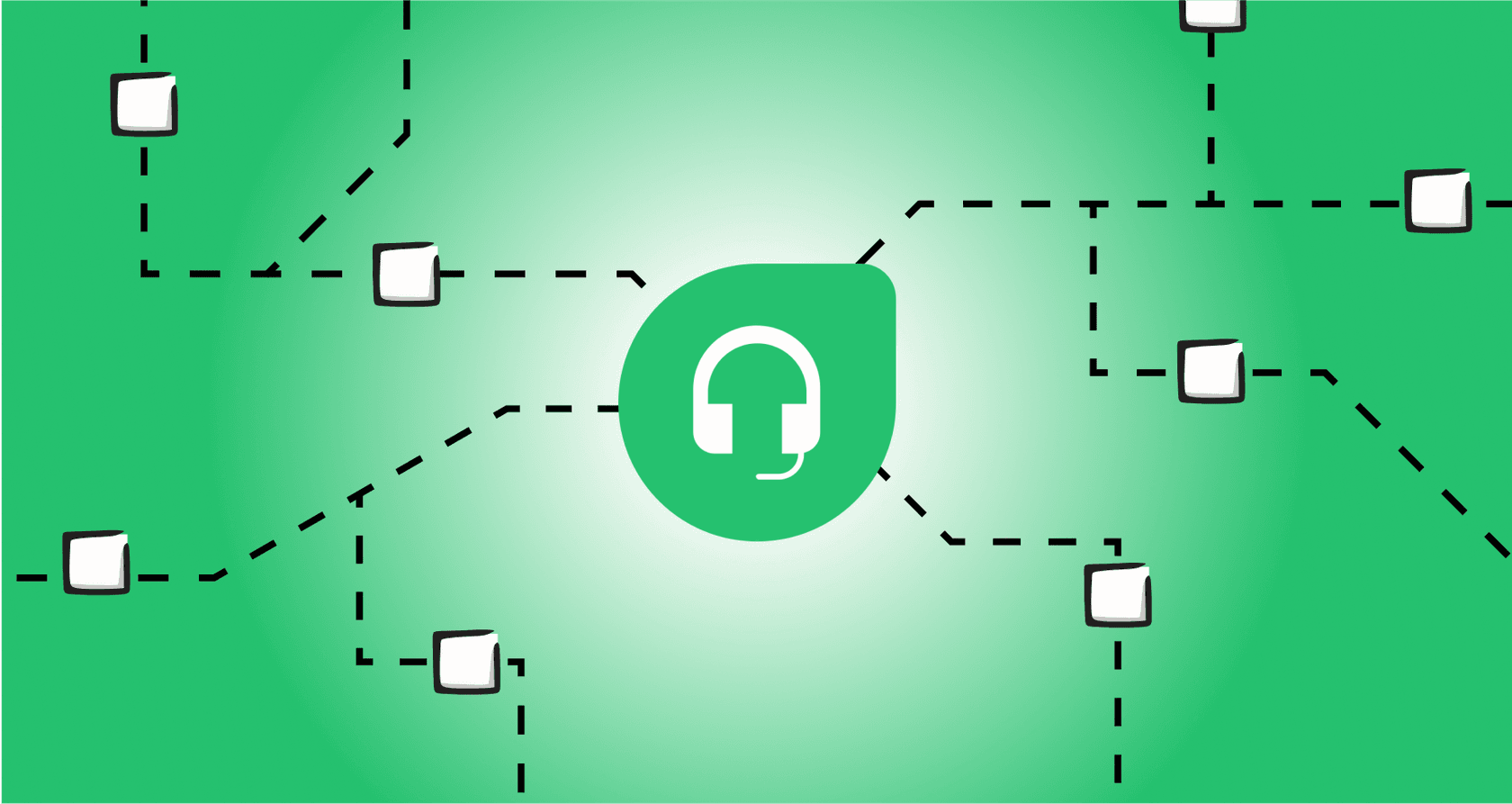Zendesk vs Freshdesk: An honest comparison for 2026

Kenneth Pangan

Katelin Teen
Last edited January 16, 2026
Expert Verified

Picking a new helpdesk is a big commitment. It’s the backbone of your entire customer experience, and choosing the right one can feel like you're locked in for the long haul. The classic Zendesk vs Freshdesk debate usually boils down to choosing between a feature-packed powerhouse and a platform that’s easy to get started with. Both are great tools, but they ask for a lot of your time, money, and energy to get them running just right.
And while both now have their own AI features, these tools are built to keep your operations running smoothly within their respective environments. But what if you didn't have to rip everything out and start from scratch? What if you could add a smarter, more flexible AI layer on top of the helpdesk you already use?
In this guide, we'll break down the Zendesk vs Freshdesk matchup and look at a third option that brings you the power of modern AI without the migration headache.
What is Zendesk?
Zendesk is known in the industry as the comprehensive, enterprise-level customer service platform. It's really built to scale, making it a go-to for larger companies with complex support needs. It helps to think of it less as one single tool and more as a whole ecosystem, the Zendesk Suite, which pieces together different products for ticketing (Support), knowledge bases (Guide), live chat (Chat), and phone (Talk).

This modular setup makes it incredibly powerful and customizable. You can manage multiple brands or complicated global workflows all from one place. Because it is so capable, it offers deep customization options that help teams build the exact workflows they need, often benefiting from a dedicated administrator to maximize its potential.
What is Freshdesk?
Freshdesk is an all-in-one helpdesk from Freshworks that built its name on being
. It’s a popular pick for small to medium-sized businesses and teams that just need to get up and running quickly without a long, drawn-out implementation.
Freshdesk provides a complete experience right out of the box, combining ticketing, reporting, and automation into a clean, simple interface. It comes with its own native AI, Freddy AI, which is designed to handle routine tasks, give agents a hand, and power chatbots. Its focus on a simple setup and user-friendly design makes it a solid choice for growing support teams of all sizes.
Zendesk vs Freshdesk: A head-to-head comparison
While both platforms are trying to solve the same core problem, they take pretty different routes to get there. Here’s a look at how they stack up in the areas that really count.
Core features and capabilities
Zendesk and Freshdesk are both loaded with features to help you manage customer conversations, though they approach certain specialized workflows differently.
Ticketing and teamwork
One thing Zendesk does really well is team collaboration, thanks to its "Side Conversations" feature. It lets agents pull in colleagues on email or Slack right from a ticket, without the customer ever seeing the back-and-forth. Freshdesk provides a similar collaborative environment through its Freshconnect app, allowing for efficient communication right alongside your tickets. Both are good at managing tickets and setting up automated workflows, though like any platform, they require proactive knowledge management to ensure information stays accessible to all systems.
Omnichannel support
Both platforms are great at pulling in conversations from email, chat, social media, and phone into one place. You really can’t go wrong with either for omnichannel support. The main difference is just in how they're packaged. Zendesk includes these tools in its Suite plans, giving you a unified, high-performance package from the get-go. Freshworks offers the flexibility to purchase products like Freshchat and Freshcaller separately, or as part of the unified Omni bundle, ensuring you have a solution that fits your specific needs.
Built-in AI and automation
Zendesk AI and Freshdesk's Freddy AI both offer things like suggested replies, automatic ticket routing, and chatbots. They can definitely help deflect common questions and make agents' lives easier. These built-in AI tools are highly effective at utilizing data inside their own platforms, such as help center articles and ticket history.
To further expand these capabilities, teams often look for ways to connect this intelligence with information stored in Confluence, Google Docs, or internal Slack channels.

Instead of relying solely on one platform’s native AI, a tool like eesel AI plugs right into both Zendesk and Freshdesk. It brings together knowledge from all your company's apps, complementing your helpdesk's existing power. This means it can provide comprehensive answers to customers while you maintain your current helpdesk setup.
Pricing and total cost of ownership
The price you see on the website is just the start. The true cost of a helpdesk includes add-ons, plan upgrades, and other details. Let's look at some of the most popular plans.
| Feature/Plan | Freshdesk Omni Growth | Zendesk Suite Team | Freshdesk Omni Pro | Zendesk Suite Professional |
|---|---|---|---|---|
| Price (per agent/mo, billed annually) | $29 | $55 | $69 | $115 |
| Key Features | Ticketing, Email, Social, Phone, Chat, Knowledge Base, Standard Reports | Everything in Team + 1 Help Center, Messaging, Basic AI | Everything in Growth + Custom Roles, Advanced Workflows, Up to 5 Products | Everything in Team + Up to 5 Help Centers, CSAT Surveys, SLA Management |
| AI Add-ons | Freddy AI Copilot: $29/agent/mo | Advanced AI: Premium capabilities | Freddy AI Copilot: $29/agent/mo | Advanced AI: Premium capabilities |
| Ideal For | Teams looking for a powerful and intuitive start with omnichannel support. | Growing teams needing a unified solution with basic AI. | Teams needing more customization and automation. | Businesses focused on performance optimization and data. |
On top of the license fees, both platforms offer various tiers to help you grow. Features like advanced workflows or CSAT surveys are available in more comprehensive plans that provide additional value to larger teams. AI features are often available as add-ons, and for complex customizations, some businesses choose to invest in professional services to ensure a perfect fit.
This is where a third-party AI platform can offer a predictable cost structure. For instance, eesel AI has straightforward, feature-based plans with transparent pricing. You're not charged per resolution, providing clear visibility for your budget. You can even start on a flexible monthly plan to see if it works for you, offering a great way to test the waters before committing long-term.
Ease of use, setup, and scalability
How easily your team can actually use and grow with a platform is just as important as what's on the feature list.
-
User Experience: Many users find that Freshdesk is very easy to use. Its clean interface and quick setup are great for teams that want to get going without a lot of hassle. Zendesk provides unmatched depth for enterprise needs; while it offers a sophisticated feature set that may require some configuration, it's designed to handle the most complex requirements for global support teams.
-
Integrations: Both platforms have huge app marketplaces with hundreds of integrations, so you can connect them to the other tools you use, from CRMs to project management software.
-
Scalability: Zendesk is built to grow with the biggest companies, offering the deep functionality and reliability needed for long-term scalability. Freshdesk allows for a quick start and provides a clear path for growth, with advanced customization and reporting features available to support larger, expanding teams.
This is a great example of why a more agile AI solution can be helpful. eesel AI’s approach is "Go live in minutes, not months." Because it's completely self-serve and connects to your helpdesk with a one-click integration, you can roll out sophisticated AI automation alongside your current setup. You can even use its unique simulation mode to test the AI on thousands of your past tickets, letting you see its impact and scale up automation with confidence.
A third option: Enhance your helpdesk instead of replacing it
So, what's the final call in the Zendesk vs Freshdesk showdown? Both are industry leaders for a reason. Zendesk offers immense power and enterprise-grade reliability, while Freshdesk is refreshingly simple to start. Both platforms are excellent at managing support, but their native AI is designed to focus on the data within their own ecosystems.
The real goal is to build the best support operation you can. Sometimes, the smartest move is to make the tools you already have even better. An independent AI layer can complement your helpdesk by bridging the gaps between your various tools.

Here's how eesel AI looks at the problem differently:
-
It works with what you've got: It plugs right into Zendesk, Freshdesk, and other major platforms. You don't have to go through a data migration.
-
It unifies all your knowledge: It connects to Confluence, Google Docs, Slack, and your past tickets to give your AI access to all your relevant documentation.
-
It’s simple and fast: You can go from signing up to having a working AI agent in just a few minutes, complementing your existing helpdesk setup.
-
You're in complete control: Use the simulation mode to test the AI on old tickets, tweak its responses, and roll out automation at your own pace.
-
Predictable pricing: Plans are based on features and volume, not on how many tickets you resolve, so you always know what to expect.
Beyond Zendesk vs Freshdesk: Give your support a smarter brain
Don't feel limited to picking one side. You can elevate your entire customer service strategy by using tools that work together. See for yourself how easily you can deploy a powerful AI agent that learns from all your company knowledge and works right inside the helpdesk your team already uses every day. Try eesel AI for free and Book a demo!
Frequently asked questions
Zendesk is designed as a mature platform for enterprises with sophisticated support needs, offering extensive customization and powerful features. Freshdesk, conversely, is widely celebrated for its intuitive interface and quick setup, making it an excellent choice for teams of all sizes.
Both platforms' built-in AIs are highly effective at utilizing data within their own systems. For teams that need to access information stored in external apps like Confluence, Google Docs, or Slack, integrating a complementary tool can help provide even broader context.
Both platforms charge per agent, per month, often billed annually. Zendesk offers tiered plans to match different team sizes, while features like advanced workflows or advanced AI capabilities are typically found in higher-tier plans to support enterprise-grade requirements.
Freshdesk is widely praised for its user-friendly interface and fast setup process, making it very accessible for new teams. Zendesk, being a more powerful and scalable platform, offers a deeper feature set that allows for extensive customization to meet specific business goals.
Zendesk is the gold standard for scaling with large enterprises, offering deep customization for intricate, evolving needs. Freshdesk provides a remarkably quick start and continues to scale with businesses, offering robust customization and advanced reporting as teams grow.
Yes, an independent AI layer, such as eesel AI, can integrate seamlessly with either platform. It unifies knowledge from all your company's applications, providing a comprehensive "brain" for your AI that works within the Zendesk ecosystem without requiring a migration.
Share this post

Article by
Kenneth Pangan
Writer and marketer for over ten years, Kenneth Pangan splits his time between history, politics, and art with plenty of interruptions from his dogs demanding attention.





